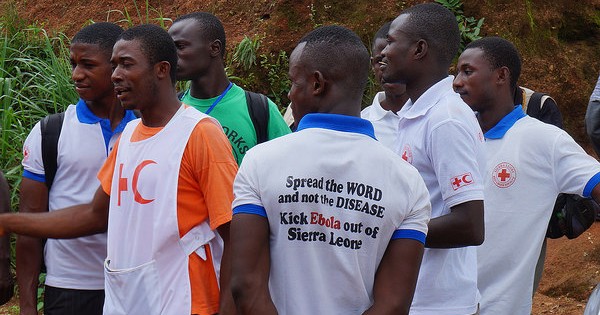Ebola Decisions and Revisions
Measures to stop the disease in its tracks are definitely works in progress

- Did you recently return from West Africa?
- Have you exchanged bodily fluids with Ebola patients?
- Did you inexplicably lick the subway poles that Dr. Craig Spencer used?
- Did you answer “no” to those three questions?
Then you probably don’t have Ebola.
Take care.
Posted by Dan Diamond, a contributor to Forbes.com, the quiz above suggests that New Yorkers needn’t panic following the diagnosis of Ebola virus in Craig Spencer, a physician with Doctors Without Borders who had returned to the United States on October 17 after treating Ebola patients in Guinea.
As the Centers for Disease Control explains, Ebola virus is spread through “direct contact with blood or body fluids (including but not limited to urine, saliva, sweat, feces, vomit, breast milk, and semen) of a person who is sick with Ebola,” or contact with virus-contaminated needles and syringes or with infected fruit bats or primates, the suspected natural reservoir hosts of Ebola. Therefore, those most at risk are health care providers and family members or friends who have had close contact with Ebola patients.
Yet it is human nature to feel alarmed on hearing of a fatal disease in our midst, and Congress is rife with calls for a travel ban on flights from the three West African countries affected by the virus: Guinea, Sierra Leone and Liberia. Such calls are ill advised, says Kamran Khan, an infectious disease physician and scientist at St. Michael’s Hospital in Toronto. “As a frontline health care provider during the SARS outbreak in Toronto, I can relate to the public’s fear of a deadly disease like Ebola,” he wrote to me via email. But, he adds, there are currently no direct flights to the United States from the affected countries, so banning flights to the United States would be pointless.
Khan is the lead author of a new report in The Lancet that examines the potential for international spread of Ebola virus via commercial air travel. He and his team of infectious disease specialists and epidemiologists coupled Ebola surveillance data with past and future international flight itinerary information from the three affected countries. Their model reveals that, on average, fewer than three Ebola-infected passengers depart from the countries on commercial flights each month.
The most efficient and cost-effective way to stop the spread of Ebola is through exit screening of travelers in their countries of origin, the researchers conclude. Passengers at risk of Ebola or those showing symptoms such as fever, severe headache, muscle or stomach pain, vomiting, diarrhea, or unexplained bleeding can be denied boarding. By contrast, entry screening in destination countries—including those that receive both direct and indirect flights from Guinea, Liberia, and Sierra Leone—would require screening of an average of 2,512 passengers, or the examination of their trip itineraries, in order to identify just one traveler from one of the three countries.
Even so, five U.S. airports have already instituted temperature checks on passengers arriving from West African countries with a high incidence of Ebola, and the governors of New York and New Jersey, Andrew Cuomo and Chris Christie, announced that health care workers who have treated Ebola patients in West Africa must remain in a 21-day institutionalized quarantine on their return. Sunday,Cuomo modified that policy to home quarantine, and on Monday officials in New Jersey released a nurse, Kaci Hickox, after a four-day quarantine in a tent.
The “potential harms” that may result from a travel ban far outweigh the perceived public gains, Kahn says. “Flights into the region are essential to maintain supply chains of medical personnel, equipment, and supplies, as well as food and other essential goods and services to address regional humanitarian and societal needs. Cutting off flights into the region would compromise the ability to get the outbreak under control in West Africa, which could lead to further regional or international spread that threatens health, security, and economic activity in other areas of the world.”
If the epidemic spreads to neighboring African countries—which has happened by land travel as well as by air—it could further set back control efforts and have global financial fallout as well, Khan notes. “In our economically interdependent world, a persistent and potentially widening outbreak in West Africa could have far broader economic implications than what is being observed today.
“A strong offense to control the outbreak in West Africa will be the best defense to minimize spread to the rest of the world.”

